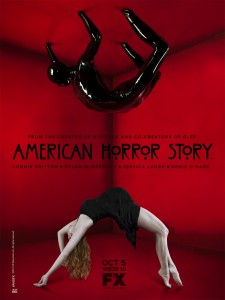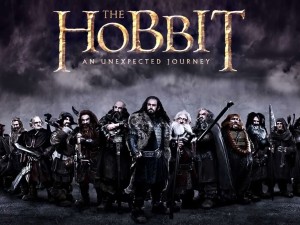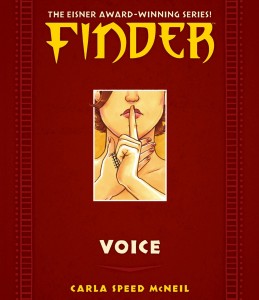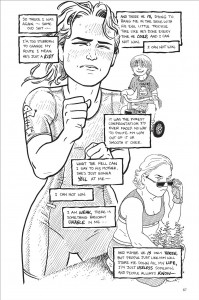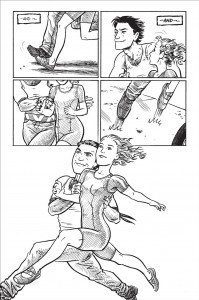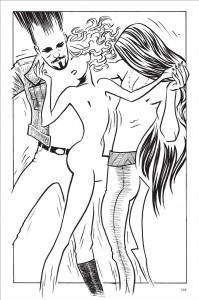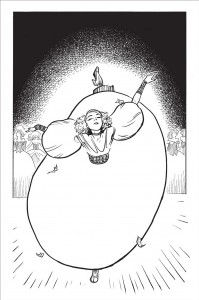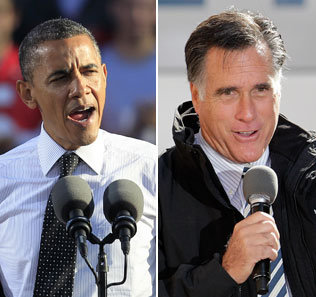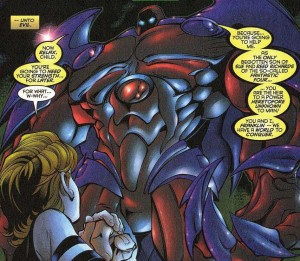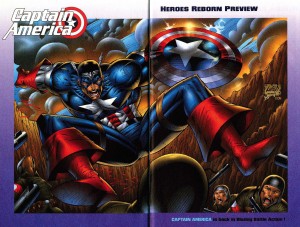American Horror Story, Season 1, 2012-13
Produced by Ryan Murphy and Brad Falchuk
Cast: Dylan McDermott
Connie Britton
Jessica Lange
Evan Peters
Taissa Farmiga
“American Horror Story” begins with Vivien Harmon (Connie Britton) discovering her husband, Ben (Dylan McDermott), in bed with one of his patients. To keep the family together (and move the plot forward) Ben convinces his angry wife and sullen daughter (Taissa Farmiga) to move to California and start over. They manage to purchase an old mansion at a bargain price, but soon discover that the reason the mansion was such a steal is due to its unpleasant history – most of its former residents were murdered. Even worse, “murder house” is filled with so many ghosts that they’re practically tripping over each other – a mad doctor from the Jazz Age, student nurses from the 60’s, a sexy maid from the 80’s, a psychotic teenager (Evan Peters) from the 90’s, and the gay couple who owned the house prior to the Harmons. And there are freakier residents, including a monster baby and the show’s most recognizable figure, the “Rubber Man,” who dresses in a skin-tight bondage suit complete with gimp mask. Rubber Man is the show’s main trouble-maker, and in one of the early episodes he rapes Vivien and impregnates her with a demonic baby. If that weren’t bad enough, the Harmons’ next door neighbor is Constance (Jessica Lange), a schemer who knows far more about the ghosts than she initially lets on.
The horror genre on television does not have an illustrious history. There are many people who get nostalgic for “The Twilight Zone” or “Tales from the Dark Side,” though those people have terrible memories because 90% of their episodes were crap. And those shows preferred the “anthology” approach, where every episode was a discreet narrative. Serialized television (where every episode is part of a single, larger narrative) has an even worse track record. For every hit like “The X-Files” there are ten flops like “The River.” Unfortunately, “American Horror Story” continues the long trend of shitty television horror.
Which is not to say that it doesn’t have its charms. Unlike “The River,” “American Horror Story” is not an complete debacle. While hardly innovative, it is a polished and professional-looking TV series. The basic premise – troubled family moves into a haunted house – is a simple but effective setup for a horror story. The series is also deliberately campy, which helps offset its tendency towards soapy melodrama (more on that below). The cast is quite impressive for basic cable, and the acting is generally good. The one weak link is Connie Britton, who responds to every situation with a look of dim-witted confusion. But Jessica Lange more than makes up for any other actor’s poor performance. Recognizing the show’s campiness and its debt to Southern Gothic horror, she plays a character that combines two archetypes: the Faded Southern Belle and the Evil Bitch Mama. Constance is by far the most entertaining character in the series, motherly one minute and crazy, narcissistic, and cruel the next. And she’s completely unafraid of the ghosts, treating most of them with barely concealed contempt.
But the series has many failings. Some of the ghosts, like the mad doctor, are entertaining in a goofy way. Others, like the the Rubber Man, are genuinely creepy (at least at first). But most of the ghosts are forgettable or annoying. Another problem is that death doesn’t seem like a big deal, which removes much of the potential tension. Sure, the ghosts are trapped in the house (except on Halloween), but otherwise they’re free to continue their un-lives however they choose. Plus, they don’t age, they can’t be permanently injured, and they can even have sex with the living or each other. The show also has a bad habit of raising interesting issues, and then addressing with them in a glib manner. For example, the psychotic teenager, Tate, killed other kids in a school shooting before he died. It’s a big, important “hot button” issue … that just kind of sits there. I might be offended if I weren’t so bored. The show also bills itself as psychosexual horror (according to the description in Netflix), but while there is sex, the psychology is absent. Rubber Man is obviously a BDSM monster, but there’s very little actual BDSM in the series. So after his initial appearance, Rubber Man becomes just another mystery villain whose identity will be revealed … during sweeps!
For all its other problems, “American Horror Story” largely fails at being horror because it has to be a TV series. This means soapy sub-plots, because TV producers believe that every show must have them. The teenage daughter must fall in love with one of the ghosts, and there must be drama and tears because Ben is an adulterer. In a soap opera, these plots might be relevant, but in a show called “American HORROR Story” they’re distracting at best, mind-numbing at worst. And the critical flaw in the series is that it both wants and needs the viewers to care about the Harmons, who are the lead characters and the emotional core of the series. The problem is that the Harmons are a typical middle class family on television, which is another way of saying they’re obnoxious assholes. In any halfway-decent horror story, the audience would get to relish the horrific punishment meted out to the Harmons. But this is prime time television in America, so we’re supposed to root for the family to overcome all odds and live happily ever after. [Spoiler alert!] To its credit, the season did not end with the family walking off into the sunset. Instead, all three Harmons died in the house and continued on as a ghost family. A surprise twist, and a clever show might have turned that into a truly horrific ending. Imagine spending the rest of eternity with the most tedious and/or annoying members of your family, with no one ever able to grow, change, or move out. But in this series, were supposed to find it bittersweet and touching that the family will be together forever. In the end, they even decorate a Christmas tree! Or maybe it’s the ghost of a Christmas tree.
Once again, a horror series has let me down.

